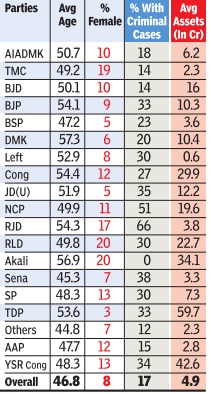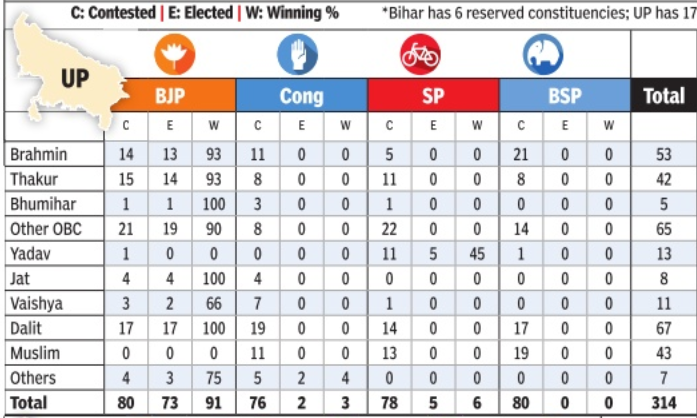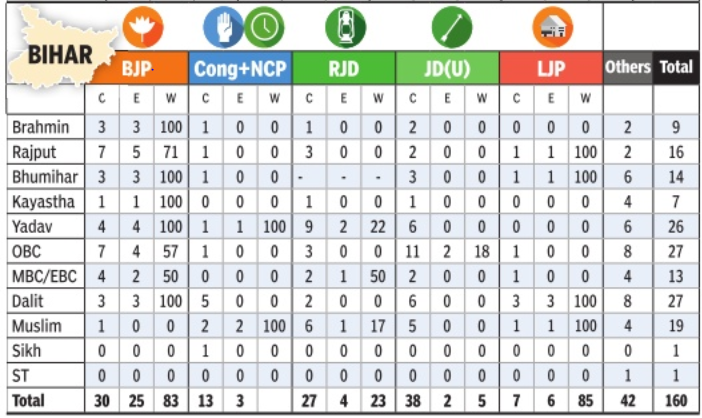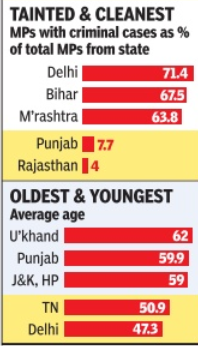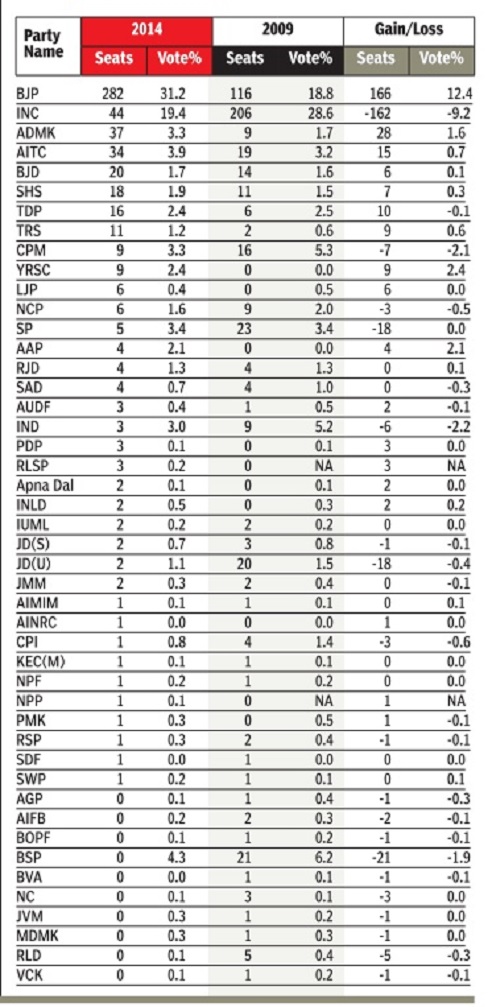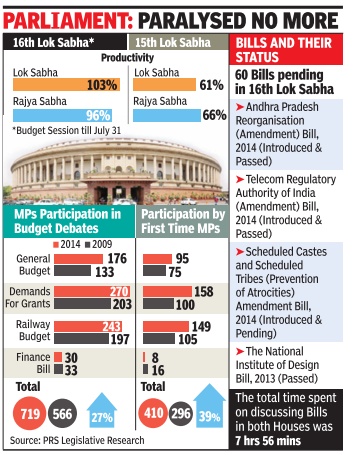The 16th Lok Sabha (2014-19): trends
(→Background check) |
(→The avocations of MPs) |
||
| Line 67: | Line 67: | ||
=The avocations of MPs= | =The avocations of MPs= | ||
''' Rahul a 'strategy consultant', Modi a 'social worker' ''' | ''' Rahul a 'strategy consultant', Modi a 'social worker' ''' | ||
| + | [[File: house.jpg| |frame|500px]] | ||
Mohua Chatterjee, [http://timesofindia.indiatimes.com/india/Rahul-a-strategy-consultant-Modi-a-social-worker/articleshow/39258749.cms The Times of India ] TNN | Jul 30, 2014 | Mohua Chatterjee, [http://timesofindia.indiatimes.com/india/Rahul-a-strategy-consultant-Modi-a-social-worker/articleshow/39258749.cms The Times of India ] TNN | Jul 30, 2014 | ||
Revision as of 11:29, 10 January 2015
These are newspaper articles selected for the excellence of their content.
|
Contents |
Background check of MPs
Caste and the 16th Lok Sabha
THE HINDI HEARTLAND'S CASTE IN STONE
The Times of India May 19 2014
We like to think of ourselves as global citizens who are part of an emerging economic superpower. But the reality is that politics in several parts of India is still mired in caste and religion. Identity politics lurks below the surface when it's not front and centre. Perhaps nowhere no more so than in UP and Bihar, which with 120 seats between them, account for close to a quarter of total Lok Sabha seats. Candidates are often chosen on the basis of whether they are Dalit or OBC or Thakur or Bhumihar or Brahmin or Muslim.
TOI reporters in UP and Bihar combed through the entire list of candidates of the major contenders in each state to ascertain their caste and religious status. There are a mind-boggling array of castes: From Dusadh, Jatav, Dom, Pasi and Musahar (all SC/Dalit), to Koeri, Yadav, Dhanuk, Kurmi and Barhai (all OBC), to Kahar, Mallah, Gangota and Tanti (all EBC or Extremely Backward Castes, somewhere between SC and OBC), to the upper caste Rajputs, Bhumihars, Kayasths and Brahmins. For reasons of space and convenience, we've clubbed into a smaller handful of groups.
UP and Bihar aren't the only states where caste politics plays a big role: It's there in Andhra, Tamil Nadu, Karnataka, Punjab, Haryana, Rajasthan, and Maharashtra (a reason for Ashok Chavan's resurrection despite the taint of Adarsh is that he's a Maratha). And if it's not caste, it's religion. But nowhere does it cast such a long and imposing shadow, and over such a huge block of seats, as the two `heartland states'. We analysed the `strike rates' of the different castes in the two states
Extremes
A HOUSE OF EXTREMES
The Times of India May 19 2014
On results day, The Times of India profiled the 16th LS, in terms of the age, gender, assets of MPs & criminal cases pending against them. The day after, The Times of India brought you a party-wise breakup. Today, find out which states sent the richest and oldest MPs, most women and criminals |
Muslims
See chart
Seats lost or gained in 2014 vis-a-vis 2009
Source: The Times of India
Victory margins in 2009 and 2014
See the chart 'Victory margins in 2009 and 2014'Source: The Times of India
Percentage of votes obtained by winning candidates
LS winners got average of 47% votes: ADR
New Delhi: TIMES NEWS NETWORK
The Times of India Jun 05 2014
This is one race that PM Narendra Modi lost. BJP’s Darshnaben Jardosh from Surat constituency pipped Modi to the post by winning her seat with a vote share of 76%. Jardosh was followed by Modi who won the Vadodara constituency with 73% of the votes polled while Chandrakant Patil from Navsari constituency won with 71% of votes polled.
According to data analysed by Association for Democratic Reforms (ADR), the winners of the Lok Sabha elections garnered an average of 47% of votes polled compared to 44% in the 2009 polls.
Out of 282 winners of BJP, 142 (50%) won with less than 50% of votes polled in their constituency while 37 (84%) out of 44 winners from Congres, 30 (81%) out of 37 winners from AIADMK, 28 (82%) out of 34 winners from Trinamool Congres, 13 (65%) out of 20 winners from BJD and 6 (33%) out of 18 winners from Shiv Sena won with less than 50% of votes polled in their constituency.
The MPs who won with less than 30% of the vote share included Ladakh MP from BJP Thupstan Chhewang who won with 26%, Congres’s Ravneet Singh Bittu from Ludhiana who won with 27% and Azmeera Naik, Mahabubabad from TRS with 29% of the vote and CPM’s Mohammed Salim with 29% of the vote.
The avocations of MPs
Rahul a 'strategy consultant', Modi a 'social worker'
Mohua Chatterjee, The Times of India TNN | Jul 30, 2014
West Bengal Congres chief and MP from Baharampur Adhir Ranjan Choudhury may have had a number of criminal cases registered against him, but he lists his profession as "social reformer," according to the Parliament website.
Rahul Gandhi's strategies may not have worked for the Congres in last elections, but in his declaration to the Lok Sabha, the Congres vice-president does not shy away from listing himself as a "strategy consultant".
The profession-wise list of 539 members of the 16th Lok Sabha offers an interesting peek into how our netas prefer to project their identities beyond politics.
The Parliament website lists 33 categories of professions ranging from agriculturists to builders, medical practitioners to educationists, teachers to sportsperson, artists to industrialists and religious missionaries to social reformers.
BJP veteran L K Advani's name figures in the category of "journalists". The party patriarch, an avid blogger, began his professional life with the R S S journal 'Organiser'. Among the other four journalists in LS are BJD's Bhartruhari Mahtab and Tathagata Satpathy. External affairs minister Sushma Swaraj and Speaker Sumitra Mahajan are listed as "advocates" by profession.
Home minister Rajnath Singh calls himself a "teacher". But his party senior Murli Manohar Joshi is registered as "professor". Giving him company is first-time MP Sanjeev Baliyan, whose name incidentally is linked to the Muzaffarnagar riots.
While Congres president Sonia Gandhi is a "political and social worker", Union minister Maneka Gandhi prefers to identify herself as a "writer", probably because she has quite a few published works to her credit.
Indian Test cricketer Kirti Azad has preferred to identify himself as the only one in the "sportsperson" category, while young MP Anurag Thakur is the only one to prefer the "cricketer" tag.
The House has four people registered as "builders," nine "artists" and seven "film artistes". If first-time MP Poonam Mahajan identifies herself as "businessperson", TMC MP Saugata Roy prefers the "educationist" tag.
BJP MP Yogi Adityanath is the only "religious missionary" in the House and Shashi Tharoor the only one to identify himself as a "diplomat".
The wealth of parliamentarians
THE RICH LIST
The Times of India May 19 2014
TOI had carried the overall and party-wise average age and assets of MPs, pending criminal cases against them and the percentage of women MPs in the 16th LS. Here's the state-wise break-up
Women
UP, BENGAL TOP LIST OF WOMEN MPs
The Times of India May 19 2014
One-third of West Bengal's MPs are women while states like K'taka, Rajasthan, Kerala and Punjab have just one MP each.
Tamil Nadu, also headed by a woman CM, elected only 4 MPs
2014: Budget session
Productivity of LS climbs to 103%
Himanshi.Dhawan @timesgroup.com The Times of India Aug 02 2014
Much like in government, the winds of change are blowing in the corridors of Parliament. After a deadlock of nearly three years, there is a flurry of activity on the floor of the two Houses. In the last three weeks, the 16th Lok Sabha recorded a productivity of 103% as discussions went past allotted hours, in contrast to the 15th Lok Sabha that worked for only 61% of the scheduled time.
Even if only Budget sessions are considered, the productivity of the LS is up steeply from 49% in 2013.
It is the first-time lawmakers who are leading the charge. In 2014, participation of first-time MPs in the debate on demand for grants increased by 58% with 158 firsttimers speaking on the subject as compared to 100 in 2009.
Analysis by independent body PRS Legislative Research shows a 41% increase in participation by new MPs in the railway budget discussion.
Interest in the general budget was also high, with 26% more participation by legislators in 2014 as opposed to 2009.
In all, participation by first-timers was up 38.5% compared to veterans whose participation increased by 27% between 2009 and 2014. There are 314 first-time MPs in this Parliament, up from 302 in 2009.
While it is early days yet, there is reason to believe this is not a flash in the pan. Organizations such as PRS and Swaniti that work closely with parliamentarians say they find greater awareness and accountability among legislators.
See also
The 15th Lok Sabha: 2009-14/ The 16th Lok Sabha (2014- ): MPs complete list of MPs / The 16th Lok Sabha (2014- ): trends
